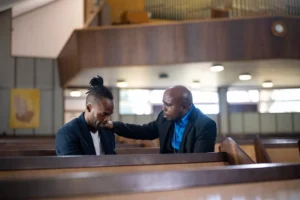Question
Answer
It is discouraging that we continue to sin. Yet, however uneven and unsteady our progress may be, by the grace of the Holy Spirit we do make progress, and we have the assurance that, one day, God’s labor to sanctify us will be completed. Then, pure in heart, we will be among those who see God. We should abide in this thought. I’m glad you see that the struggle with sin is a real war. But our commanding general is Jesus Christ. Just recognizing this ought to make us lift our heads, like soldiers who hear the trumpet.
You ask whether discouragement can be a sin. Yes, I think it can. Of course there are different ways to be downcast. The sorrow that leads to repentance is a blazing grace of God which is followed by the joy of forgiveness, and we needn’t fear it. But the moral torpor which tempts us to give up is a flaming dart of the adversary which is followed by despair, and we should battle it like an invader in our home. If you want to know how to battle it, read Ephesians 6. And don’t be discouraged about your susceptibility to discouragement! Christ can defeat that too.
Traditionally, the sinful kind of discouragement was called “acedia” and considered one of the seven “cardinal” sins. Some people are tempted to acedia when they see the depth of sin in our cultural institutions. Others, perhaps like you, are more strongly tempted to it when they see the depth of their own sinful tendencies. A common element in both temptations is doubt in the sovereignty of God — doubt in His power to do what He says He will do, to establish His Kingdom both inside and outside of us. We imagine that sin is stronger than He is. But it isn’t.
Right after Paul’s description of the helplessness of sin in Romans 7, he says “What a wretched man I am!” and asks “Who will deliver me from this body of death?” But he answers himself instantly: “Thanks be to God — through Jesus Christ our Lord!” Just a chapter later he says “I am convinced that neither death nor life, neither angels nor demons, neither the present nor the future, nor any powers, neither height nor depth, nor anything else in all creation, will be able to separate us from the love of God that is in Christ Jesus our Lord.”
I think you’ll also be encouraged by the following quotations from the letters of C.S. Lewis.
I know all about the despair of overcoming chronic temptations. It is not serious, provided self-offended petulance, annoyance at breaking records, impatience etc. don’t get the upper hand. No amount of falls will really undo us if we keep on picking ourselves up each time. We shall of course be very muddy and tattered children by the time we reach home. But the bathrooms are all ready, the towels put out, and the clean clothes in the airing cupboard. The only fatal thing is to lose one’s temper and give it up. It is just when we notice the dirt that God is most present in us: it is the very sign of his presence. (Jan. 20, 1942)
The stories you tell … belong to a terribly familiar pattern: the man of good will, saddled with an abnormal desire which he never chose, fighting hard and time after time defeated. But I question whether in such a life the successful operation of Grace is so tiny as we think. Is not this continued avoidance either of presumption or despair, this ever renewed struggle itself a great triumph of Grace? Perhaps more so than the (to human eyes) equable virtue of some who are psychologically sound. (May 28, 1952)
You know what Luther said: “Do you doubt if you are chosen? Then say your prayers and you may conclude that you are.” (Aug. 3, 1953)
Grace and peace,
PROFESSOR THEOPHILUS
Copyright 2003 Professor Theophilus. All rights reserved.









